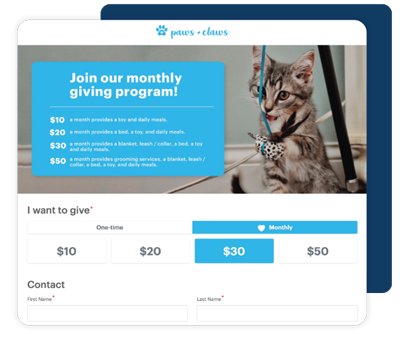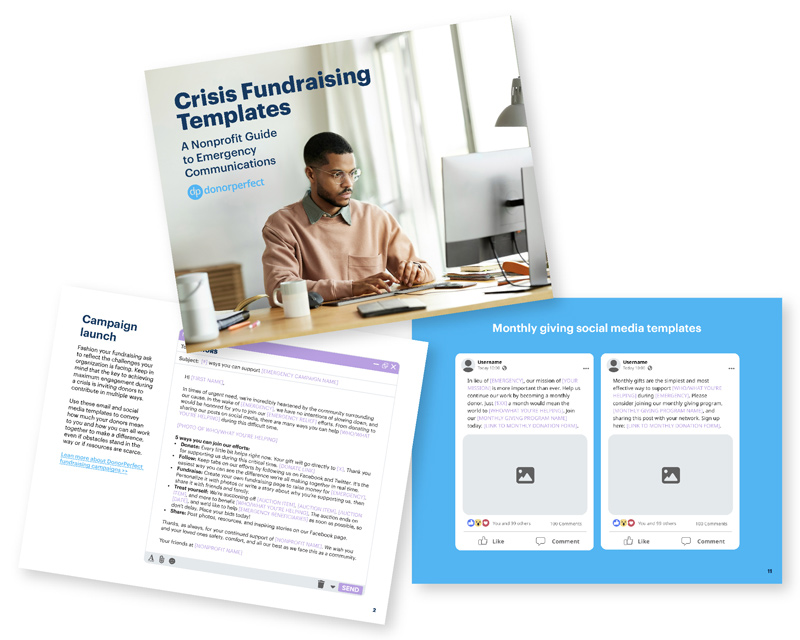Nonprofit Technology & Fundraising Blog
Subscribe to our mailing list

October 27, 2023 | Online Fundraising, Planning
When your community is affected by an emergency situation or fundraising crisis – which could be anything from a flood or a fire to a school closing or a virus outbreak – it can be challenging to keep struggling families afloat and small businesses thriving. This is especially true if your nonprofit is a small-to-medium-sized operation with limited staff and resources. The good news is that you can make an impact in your community while still achieving your mission.
How? Communities are kept vibrant through collaboration, and in an emergency, everyone can align around a common goal. The more people you have talking about relief efforts, the better. Working with others allows you to cast a larger net and expand your reach to new contacts.
You can band together with local businesses, organizations, and politicians to gain support and bring relief to your community. Events like cleanups, food drives, dinners, and walkathons will be more successful with more hands on deck. Here are some tips to connect with your fellow community members to make things happen.
Develop a connection with residents, businesses, and organizations in your community by supporting and promoting each other.
Consider creating social media posts that introduce your Executive Director or board members, explain your specific goals related to the fundraising crisis, and seek to find others who share your compassion. Be sure to include photos so you will stand out in social media feeds, and tag collaborators so they can easily share posts with their network.
Remember that the best way to build your own social media following is by following others! Look for local businesses and organizations that might be affected, or that serve those who have been affected by your emergency. Keep an eye out for new faces who may benefit from learning more about the work you do.
You’re certainly not limited to social media for opportunities to introduce yourself. Don’t be afraid to get out there and greet community members in person, but try not to solicit them right away. Instead of bringing business cards door to door or asking for donations, you can build more genuine connections by striking up a conversation while showing your support. Try patronizing local businesses, attending charity events, or sitting in on community meetings. When discussing the state of your neighborhood, possible solutions will come up naturally, and people will be eager to hear about how your nonprofit can help.
After introducing yourself and your nonprofit in a community forum, whether it’s online or in person, stay in touch to provide updates about what you have planned.
In order to bring relief to your community, it’s necessary that you take time to listen to the needs and concerns of those you serve. When people feel like you will genuinely listen to them – and trust that you will take action based on what you’ve heard – they tend to be more open with you and supportive of your efforts. Ultimately, these exchanges will allow your nonprofit to make better decisions and with more buy-in.
On social media, on your website, and at local events, invite feedback from community members about what they’d like to see accomplished in the near future. Start by finding out their top concerns about the emergency situation, and ask what would make them feel more comfortable.
Try to do this as often as possible, even after your fundraising crisis has subsided. Think of ways you can continue to solicit feedback on a consistent basis. Maybe you can host regular video calls with business owners and neighborhood organizations to discuss what they need. Maybe you can post weekly polls on your organization’s Facebook page.
Remember, instead of asking for donations straight away, it’s better to ask community members to collaborate with you. This is an important practice in or out of a fundraising crisis, as it will help you form genuine relationships that stand the test of time.
What does collaboration look like? You don’t have to cold call anyone or slide into anyone’s messages if you’re not comfortable making a direct proposal. Instead, you can post a “call to action” on your social media or website.
DonorPerfect Online Forms empower you to create an emergency donation page for your fundraising crisis, or quickly update your existing donation page to include powerful photos and crowdfunding options.

Once you have collaborators, be sure to post a list of participating businesses and organizations online – including tags and/or links to their sites – to encourage further collaboration and provide an incentive to get involved.
Feeling pressured to tie up loose ends before you take action? Tasks that seem small at first – like updating your online donation form or implementing a crowdfunding tool – can quickly become overwhelming, especially with an emergency looming. In a crisis, it’s more critical than ever to rely on your staff and fundraising platform for support.
Prepare for your campaign launch by leaning on the resources available to you and asking for help from someone you trust. At DonorPerfect, we offer free training resources that can be accessed at any time, including Knowledgebase articles and recorded webinars. Fundraisers can also call or chat with a DonorPerfect expert for one-on-one attention, or schedule a group session for their team.
Fellowship helps, too. Fundraisers who have been in your position before may be able to provide the best insight. For more emergency fundraising resources, written by our team of experts, check out the following articles:
How to Prepare Your Nonprofit for a Fundraising Crisis »
Keys to Fundraising During a Crisis: How to Spring Into Action »
Once you’ve established relationships with new donors and fundraising partners, you can maintain these connections by keeping them engaged with all the good you’re doing in your community. Create a contact list for letters, emails, and calls announcing your upcoming fundraising opportunities.
Not sure how to word your email reminders or how often to send them? We created fill-in-the-blank templates to help you! Download your free Crisis Fundraising Templates, available below, and New Donor Welcome Series Email Template Kit.

We wish you and your organization the best of luck in your relief efforts. No matter your fundraising emergency, the DonorPerfect team would like to thank you for going the extra mile to uplift your community, and for your trust in us to support you.
Follow us on social!